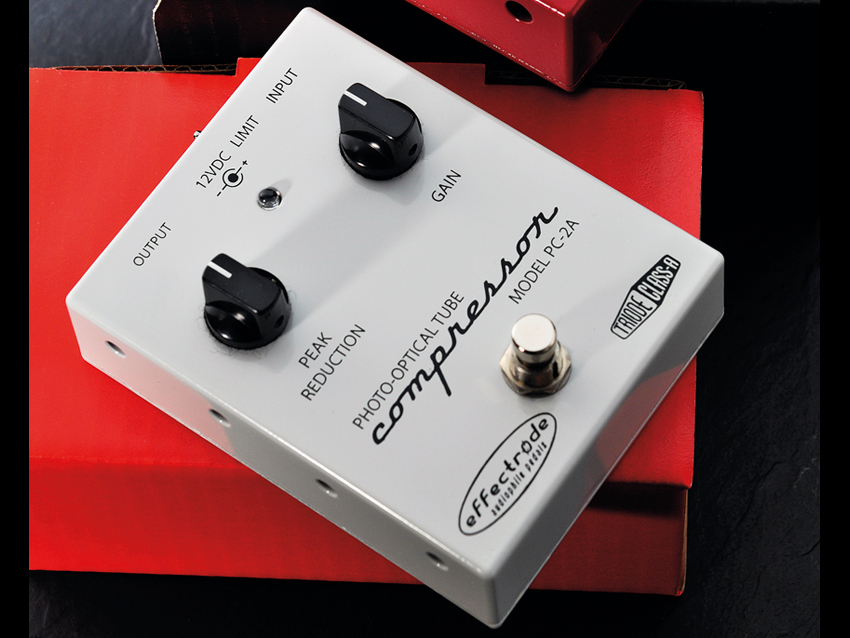MusicRadar Verdict
Studio audiophile quality valve compression in a stompbox. Very nice!
Pros
- +
Audibly high quality compression in a stompbox.
Cons
- -
There's nothing to dislike here.
MusicRadar's got your back
Effectrode's pedals are built in the USA, but its 'effects scientist' Phil Taylor is based here in the UK. The company has an ever- growing range of valve-drivenstompboxes, with an emphasis on overdrive, boost and the'classic' range of modulation effects: phase, chorus, tremolo and Univibe-style rotary speaker emulation.
While previous Effectrode pedals were chunky beasts, this compressor pedal is just slightly larger than your average stompbox. To continue with the valve theme, it uses the 6112 dual triode - a tiny 'subminiature' valve once used as a proximity trigger in WW2 anti-aircraft shells!
"In practice, and to our ears, this makes for a very enjoyable pedal to use. Even with maximum gain reduction, it's easy to forget it's there at all..."
It also has a rugged, all-steel chassis, with all connections on the rear edge to maximise 'board space. As with all Effectrode pedals, it comes with a 12-volt power supply - because of the voltages required to drive the valves, batteries aren't up to the job.
Build
In keeping with the audiophile design ethic of Effectrode pedals, the PC-2A is inspired by one of the finest compressors ever made, the legendary LA-2A studio compressor.
Although the LA-2A was designed to cope with a lot more than just electric guitar, Phil Taylor realised that the fast attack of its photo-resistive circuitry would make it ideal as the basis for a guitar pedal.
With a simpler layout than many compressor pedals, the PC-2A has just two controls. The peak reduction knob performs two functions: setting the ratio (the amount of compression) and the threshold (the point at which the input gain triggers the compressor).
The gain knob then boosts the signal to make up for the effect of compression, although it can also be used to add extra valve boost.
The limit/compress switch changes the nature of compression; in limiter mode the compression ratio is much higher and more noticeable.
Sounds
It's difficult to describe a compressor's sound, because so much of its value lies in what it removes from your sound. However, the PC-2A does have a recognisable voice, adding smoothness and warmth. Compared with many vintage- flavoured compressors, the attack is very fast, in keeping with the LA-2A heritage.
Meanwhile, the release is barely noticeable in standard compression mode. According to the manual, the photocell has a natural two-stage decay shape; after 40-80 milliseconds it reaches half of its initial resistance, and then the rest of the recovery can take up to several seconds, depending on the intensity of the previous signal.
In practice, and to our ears, this makes for a very enjoyable pedal to use. Even with maximum gain reduction, it's easy to forget that the pedal is there at all… until you turn it off and realise how dynamically ragged your playing is without it.
The Limiter setting on the mini toggle switch is probably going to be less useful for most guitarists, but for times when you need some serious squashing, it has an even warmer, smoother sound than the other mode.
We've never yet been disappointed by the sound quality of an Effectrode pedal, and this one is really excellent. Compressors tend to be considered superfluous by many guitarists, but there's so much to be gained by using one, especially on clean-toned parts.
The PC-2A isn't one of the lazy, squishy compressors that we've seen from several 'boutique' builders, it's far more crisp and precise, but it does add a wonderful warmth to your tone, as well as obvious audiophile quality.
Baby Audio's Smooth Operator spectral balancing plugin goes pro
"It was ugly, like watching a divorce between four people. After a while, I had to get out": Beatles engineer Geoff Emerick on the recording of Abbey Road, track-by-track
"I said, “What’s that?” and they said, “It’s what Quincy Jones and Bruce Swedien use on all the Michael Jackson records": Steve Levine reminisces on 50 years in the industry and where it’s heading next










